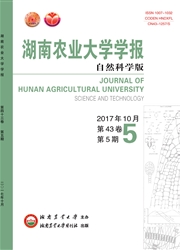

 中文摘要:
中文摘要:
以5年生盆栽枳砧‘山下红’温州蜜柑为试材,于2012年7月5日至11月15日进行控水试验,以正常浇水为对照,研究40%土壤水分胁迫处理对温州蜜柑果实品质及柠檬酸代谢过程中3个相关酶基因表达的影响。结果表明:处理组成熟果实单果重、果皮重、横径与纵径分别比对照组减小了59.0%、61.7%、25.2%和21.7%,与对照组问的差异均达极垃著水平;处理组果实中果汁与维生素C含量减少,而可溶性固形物含量增加;处理组果肉中的蔗糖、葡萄糖、果糖与总糖含量较对照分别增加了33.3%、72.3%、65.0%和48.9%,而单果蔗糖、葡萄糖、果糖与总糖含量分别减少了42.1%、25.1%、2813%和37.8%;处理组果肉中的柠檬酸和总有机酸含量分别比对照组高66.3%和60.4%,单果柠檬酸和有机酸含量比对照组高11.3%和50.6%,与对照间的差异均达极显著水平;基因表达结果显示,在水分胁迫下,CitCS的表达量增加,而CitIDH的表达量减少,CitACO表达量在果实发育后期有一定的增加。总体而言,水分胁迫明显抑制了温州蜜柑果实生长,单果柠檬酸含量增加,而糖分含量减少,糖酸比下降,果实品质下降。CitCS表达量增加及CitACO表达量下降可能是柠檬酸积累的原因之一。
 英文摘要:
英文摘要:
The influence of water stress on fruit quality and gene expression related to citrate metabolism of citrus were conducted from July 5 to November 15 in 2012 using five-year-old satsuma mandarin trees with 40% soil water conditions by taken regular watering as control. The results showed that water stress significantly decreased single fruit weight, peel weight, fruit transverse and longitudinal diameter of citrus by 59.0%, 61.7%, 25.2% and 21.7% compared to the control, respectively. Water stress brought about the decrease of ascorbic acid and juice content in fruit, however, soluble solids was promoted. Furthermore, it was found that the content of sucrose, glucose, fructose and total sugar per gram sarcocarp in water stress were raised obviously by 33.3%, 72.3%, 65.0% and 48.9% respectively, the content of them in single fruit, while, were obviously declined by 42.1%, 25.1%, 28.3% and 37.8% respectively. The content of total organic acids and citric acid per gram sarcocarp were extremely increased by 66.3% and 60.4% respectively compared to those in the control. So did the content of citric acid and total organic acids per gram sarcocarp which were very significantly increased by 11.3% and 50.6% respectively. Related gene expression results indicated that the expression level of CitCS was increased while CitIDH degreased in water stress. CitACO was increased at the late stage of fruit growth. In general, water stress could obviously suppress the growth of satsuma mandarin and significantly caused the accumulation of citric acid as well as lead to the decrease of sugar content in fruit, which resulted in the decline of the ratio of sugar to acid and fruit quality. The up-regulation of CitCS and down-regulation of CitIDH might be one of the reasons that promoted to the accumulation of citric acid.
 同期刊论文项目
同期刊论文项目
 同项目期刊论文
同项目期刊论文
 期刊信息
期刊信息
